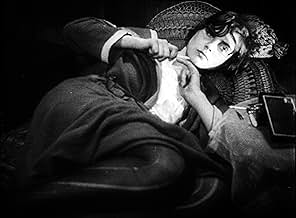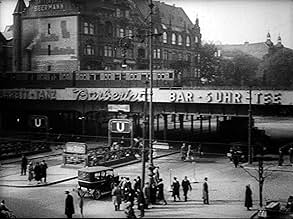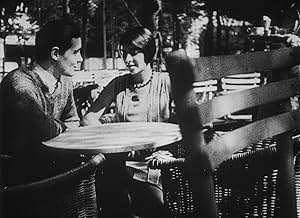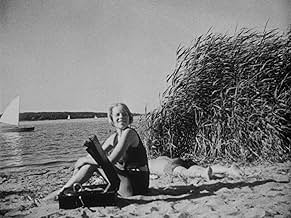IMDb RATING
7.3/10
3.8K
YOUR RATING
Two men and two women enjoy a pleasant Sunday at the beach amid the unending toil of the working week.Two men and two women enjoy a pleasant Sunday at the beach amid the unending toil of the working week.Two men and two women enjoy a pleasant Sunday at the beach amid the unending toil of the working week.
Kurt Gerron
- Self
- (uncredited)
Valeska Gert
- Self
- (uncredited)
Heinrich Gretler
- Self
- (uncredited)
Moriz Seeler
- Photo Subject at Beach
- (uncredited)
Ernö Verebes
- Self
- (uncredited)
Featured reviews
10tilmazio
Some of the people commenting on this movies mention the fact that it was made only three years before Hitler came to power. While this is true, it is a historical misunderstanding to think that in 1929, when the film was conceived and shot, Hitler was inevitably looming at the political horizon in Germany. In fact, in the Weimar republic of the late 20s there was good reason to believe, that the worst was over for Germany after the chaotic post-WWI-period. The economy had somewhat stabilized, the political circumstances were still chaotic, but I guess people had grown accustomed to the fact that the government changed every so often. Germany was not a democracy in the truest sense of the word, but there was a thriving lower-middle class, and that is what the people in the film are meant to represent. There was good reason to believe, that these people would be typical of Germany at this time. To think that the film makers were delusional about the true state of the German state is a judgement that comes out of knowing what happened later.
Thats what makes this film even more special in my thinking. It shows that there could have been potentially another Germany, and that fascism was not the inevitable consequence of the social condition in the early 30s, German national character or what so ever. In fact, I think thats why this master piece is not as well-known as it deserves to be. It does not fit the bill of 1920s Mabuse-style Germany, where Caligari was an early warning of the Nosferatu was the blue-print of a coming dictator etc, all this Kracauer stuff.
Having said that, I would like to point out two additional things about this film, that make it unique. First of all, with its on-location shot, its amateur actors and its next-to-nothing ,yet social realist story, it is a rare fore-runner of the post-war cinema of Italy etc, that has not acknowledged. (Then again, Rosselini et al never saw this film, but then again, where is the "neo" in "neo-realism" coming from.) It also seems to me that this might very likely be the first "indie" movie. "Indie" is of course a very vague term, and what is called "Independent cinema" differs greatly depending on where the critic is coming from. But I personally know of no other movie, that actually made it into the movie houses, that was produced by a handful of non-pros without the support of a studio. Of course, there are the surrealist films etc, but this was a reasonably successful film, not some art experiment. This is a very daring thesis, I know, but so far nobody was able to prove me wrong....
Thats what makes this film even more special in my thinking. It shows that there could have been potentially another Germany, and that fascism was not the inevitable consequence of the social condition in the early 30s, German national character or what so ever. In fact, I think thats why this master piece is not as well-known as it deserves to be. It does not fit the bill of 1920s Mabuse-style Germany, where Caligari was an early warning of the Nosferatu was the blue-print of a coming dictator etc, all this Kracauer stuff.
Having said that, I would like to point out two additional things about this film, that make it unique. First of all, with its on-location shot, its amateur actors and its next-to-nothing ,yet social realist story, it is a rare fore-runner of the post-war cinema of Italy etc, that has not acknowledged. (Then again, Rosselini et al never saw this film, but then again, where is the "neo" in "neo-realism" coming from.) It also seems to me that this might very likely be the first "indie" movie. "Indie" is of course a very vague term, and what is called "Independent cinema" differs greatly depending on where the critic is coming from. But I personally know of no other movie, that actually made it into the movie houses, that was produced by a handful of non-pros without the support of a studio. Of course, there are the surrealist films etc, but this was a reasonably successful film, not some art experiment. This is a very daring thesis, I know, but so far nobody was able to prove me wrong....
A German silent curio heralds several future magnates of the film industry in Hollywood, PEOPLE ON Sunday is the debut feature for both its directors Robert Siodmak and Edgar G. Ulmer, with a script from a tender-age Billy Wilder and Fred Zinnemann in the camera branch. It is a bracing urban symphony of Berlin during the interwar times, confining its time-frame within a weekend, convenes a cast of five non-professional young actors (who are essentially playing themselves) and blithely breaking the boundary of studio lot and taking the story onto the streets of the metropolis, from a rush-hour Behnhof Zoo train station near the beginning to the movie's main course, a Sunday outing in Wannasee.
The quintet are Erwin, a taxi driver, his model wife Annie, and his friend Wolfgang, a wine dealer, then Christl, a film extra Wolfgang accosts in the said train station and Brigitte, her friend, who works in a record shop. Throughout its simple plot structure, the narrative heartily proceeds with a bifurcating stratagem, a plump, honest-looking Erwin's squabble-plagued marital life with a languorous Annie in their pokey bedsit, contrasting with a louche Wolfgang's pat oscillation in wooing either Christl or Brigitte, furthermore, a tangible rift is wondrously evinced between the two flappers, Christl is the prim and proper type, who naturally spurns Wolfgang's advances in the well-orchestrated lake-swimming sequences, but when she notices that Wolfgang takes his offensive towards a more skittish Brigitte and the two become lovey-dovey, she can barely contain her pique, not only to Wolfgang, but also to her girlfriend.
Yet, what leaves the most piquant tang is a thoroughgoing embodiment of machismo by the two male creatures, Erwin is the off-limits married man, both girls give him a decent berth, humbled by a comparatively more good-looking and athletic Wolfgang, he knows his role very well, a sausage juggler for laughter, a cavalier company, completely forgets about Annie's absence when there are new girls around, but also seemingly attests that, when sex is off the table, girls are just girls, no further communication is worth his effort. Wolfgang is more or less more readable, cops a feel whenever he can find a chance but will not get his feet wet into a stable relationship, and if a girl becomes too pushy, there is always a Sunday football match he can attend with his buddy Erwin.
A lilting juvenilia robustly interpolates expressionistic portraiture and vignettes (there are some very impressive close-ups both in still and in motion should be attributed to the young but ingenious film crew) in all the larking and perambulating, PEOPLE ON Sunday can still turn heads not just as a chirpy comedy, but also, a counter-time escapist prose because unfortunately we cannot blot out the fact that something egregiously sinister was incubating in that touchy era and that particular country.
The quintet are Erwin, a taxi driver, his model wife Annie, and his friend Wolfgang, a wine dealer, then Christl, a film extra Wolfgang accosts in the said train station and Brigitte, her friend, who works in a record shop. Throughout its simple plot structure, the narrative heartily proceeds with a bifurcating stratagem, a plump, honest-looking Erwin's squabble-plagued marital life with a languorous Annie in their pokey bedsit, contrasting with a louche Wolfgang's pat oscillation in wooing either Christl or Brigitte, furthermore, a tangible rift is wondrously evinced between the two flappers, Christl is the prim and proper type, who naturally spurns Wolfgang's advances in the well-orchestrated lake-swimming sequences, but when she notices that Wolfgang takes his offensive towards a more skittish Brigitte and the two become lovey-dovey, she can barely contain her pique, not only to Wolfgang, but also to her girlfriend.
Yet, what leaves the most piquant tang is a thoroughgoing embodiment of machismo by the two male creatures, Erwin is the off-limits married man, both girls give him a decent berth, humbled by a comparatively more good-looking and athletic Wolfgang, he knows his role very well, a sausage juggler for laughter, a cavalier company, completely forgets about Annie's absence when there are new girls around, but also seemingly attests that, when sex is off the table, girls are just girls, no further communication is worth his effort. Wolfgang is more or less more readable, cops a feel whenever he can find a chance but will not get his feet wet into a stable relationship, and if a girl becomes too pushy, there is always a Sunday football match he can attend with his buddy Erwin.
A lilting juvenilia robustly interpolates expressionistic portraiture and vignettes (there are some very impressive close-ups both in still and in motion should be attributed to the young but ingenious film crew) in all the larking and perambulating, PEOPLE ON Sunday can still turn heads not just as a chirpy comedy, but also, a counter-time escapist prose because unfortunately we cannot blot out the fact that something egregiously sinister was incubating in that touchy era and that particular country.
Extraordinary and very simple silent film, put together by some of the most remarkable talents of Twentieth Century Cinema - just read those credits! Within a few years most of these people were in Hollywood, and Hitler had destroyed both the wonderful film industry they had helped build and the joyous Berlin that this film depicts.
The film tells the story of four strangers, two men and two women, enjoying a lazy Sunday by a lake in Berlin. Nothing much seems to happen, but there is a lot going on, as the four interact. There is innocence, the potential for love, the danger of sex, the force of jealousy and the pain of longing. And through it all is the joy of living!
Magnificently shot - largely in extreme close-up - the film allows us a glimpse of Berlin between the wars and it is sad to watch it with the knowledge of what was soon to be. It would have been impossible to make this film with dialogue - the words would have destroyed the nuance and the emotion. It reveals the power of silent cinema.
If the print you see is without a soundtrack, as mine was, then may I recommend playing the Essential Marlene Dietrich during the film. I did this and the combination was unforgettable.
The film tells the story of four strangers, two men and two women, enjoying a lazy Sunday by a lake in Berlin. Nothing much seems to happen, but there is a lot going on, as the four interact. There is innocence, the potential for love, the danger of sex, the force of jealousy and the pain of longing. And through it all is the joy of living!
Magnificently shot - largely in extreme close-up - the film allows us a glimpse of Berlin between the wars and it is sad to watch it with the knowledge of what was soon to be. It would have been impossible to make this film with dialogue - the words would have destroyed the nuance and the emotion. It reveals the power of silent cinema.
If the print you see is without a soundtrack, as mine was, then may I recommend playing the Essential Marlene Dietrich during the film. I did this and the combination was unforgettable.
This silent semi-documentary boasts quite a remarkable roster of young talent behind the camera: Billy Wilder, writing his first screenplay; Curt and Robert Siodmak at the helm, aided by contributions from Edgar G. Ulmer and Fred Zinnemann – all of them still in their twenties, all at the beginning of notable careers. The most interesting aspect in front of the camera is the shots of everyday life in Berlin immediately before Adolf Hitler's meteoric rise to power. Many of the people you see going about their ordinary, everyday lives – including possibly the young leads – will have participated in the war into which Hitler would plunge their country in nine short years – or been consigned to concentration camps from which they'd never emerge.
The plot is virtually non-existent: a couple of young men take a couple of young girls to the park for a little frolicking in the lake (and something a little more intense for one couple). The characters are curiously remote, making it difficult for the audience to get to know – or like – them. They are no heroes or villains as such – although there is an air of callousness about the men – so perhaps in a way, this apparent decision to keep at the audience at arm's length can be seen as one of the film's strengths – a reflection of people the way they are (the leads were all non-actors, plucked from obscurity for their brief moment of film stardom before returning back to lives of anonymity). This sense of emotional detachment persists even when the film reaches its most sensuous moments, possibly because Wilder et al fail to decide whether they are telling us a story about people as a group or people as individuals and thus devote inadequate time and attention to both.
The plot is virtually non-existent: a couple of young men take a couple of young girls to the park for a little frolicking in the lake (and something a little more intense for one couple). The characters are curiously remote, making it difficult for the audience to get to know – or like – them. They are no heroes or villains as such – although there is an air of callousness about the men – so perhaps in a way, this apparent decision to keep at the audience at arm's length can be seen as one of the film's strengths – a reflection of people the way they are (the leads were all non-actors, plucked from obscurity for their brief moment of film stardom before returning back to lives of anonymity). This sense of emotional detachment persists even when the film reaches its most sensuous moments, possibly because Wilder et al fail to decide whether they are telling us a story about people as a group or people as individuals and thus devote inadequate time and attention to both.
If you enjoy classic silent cinema then you won't want to miss this treat. At times scenes are reminiscent of King Vidor's The Crowd, made just the year before (most especially in those moments set indoors, during which one of the couples gently bicker or the scene during which the principals first meet up for their group date); while at others the open air, carefree mood is suggestive of Renoir's masterpiece Partie de Campagne, made a decade later. But People on Sunday is a distinct work in its own right, an evocative film made by some stellar talent: the Siodmak brothers, Edgar Ulmer, Billy Wilder and Fred Zimmerman - all of whom would go on to varying degrees of success in the States after fleeing the Nazis. Their film is thus both a record of a time lost, a beautifully shot piece showing a Berlin that was soon to vanish for ever, as well as demonstrating the collaborative talents of some major figures in their early years. There is no hint of the dark years to come seen here, or the debilitating effects of run away inflation which marked the end of the Weimar Republic and led to the inexorable rise of extreme politics. People on Sunday is above such explicit social comment, unless it is political by the mere fact of focusing on ordinary people. It simply tells the tale of a group (played by non professional actors we are informed, but it hard to tell such is the quality of the performances) enjoying themselves while out on one sunny weekend day, picnicking, boating, kissing, promising more to each other and so on, interspersed with more general shots of the German people similarly at play. The skill and pleasure for the viewer today is in the way this is done, completely without ostentation, shot marvelously, everything still feeling fresh, spontaneous and genuine , and with a real feeling for place. Ironically, for this viewer at least, so much of the film seems so natural and fluid that one is more aware that is an illusion; such unforced art as this takes a great deal of time, patience and skill on the part of the participants and creators.
If you want to see more of German cinema from this period, other than more familiar classics, then this is a real treat, being both less known and marvelously restored. The BFI DVD version has been created from several sources and is the longest version available. It also features a splendid Weill-like score, which fits the milieu like a glove and which begs issuing separately as it stands up well as a listen on its own.
If you want to see more of German cinema from this period, other than more familiar classics, then this is a real treat, being both less known and marvelously restored. The BFI DVD version has been created from several sources and is the longest version available. It also features a splendid Weill-like score, which fits the milieu like a glove and which begs issuing separately as it stands up well as a listen on its own.
Did you know
- TriviaThe film was a major hit when it was released in Germany in 1930. Five of the people who worked on the film went on to direct films in Hollywood: Curt Siodmak, his brother Robert Siodmak, Edgar G. Ulmer, Fred Zinnemann, and Billy Wilder.
- GoofsWhen the movie star picture cards are torn off the wall, the number of cards still on the wall constantly changes. Sometimes more cards are still on the wall than in the shot before, etc.
- ConnectionsFeatured in Histoire(s) du cinéma: Toutes les histoires (1988)
- How long is People on Sunday?Powered by Alexa
Details
- Runtime1 hour 13 minutes
- Color
- Sound mix
- Aspect ratio
- 1.20 : 1
Contribute to this page
Suggest an edit or add missing content

Top Gap
By what name was Les hommes le dimanche (1930) officially released in India in English?
Answer



























